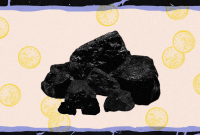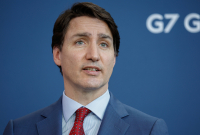Support strong Canadian climate journalism for 2025
The leader of the BC Green Party says that provincial and municipal officials' slow response to a late January "incident" at a Vancouver-area refinery that smothered parts of Metro Vancouver in a hydrocarbon haze is cause for concern.
On the morning of Jan. 21, people across Metro Vancouver awoke to a foul-smelling smoke. Hours later, officials with the regional government and Environment and Climate Change Canada warned people to stay inside and close windows to avoid the smell. Officials have not yet released a full list of the chemicals in the plume from the Parkland Refinery.
"What really struck me was that in the official reports coming from governments — whether it was the municipalities or the provincial government — it seemed that the orientation was to protect the reputation of the refinery and that protecting public health wasn't the first priority," said Sonia Furstenau, leader of the BC Greens.
She said she would have liked to see more independent air quality monitoring, a requirement that any elevated air pollution levels be immediately announced publicly and "absolute transparency about what was coming out of the refinery."
It took government and company officials roughly four hours on Jan. 21 to start releasing information about the event and warning people to avoid the petrochemical haze, particularly if they had pre-existing health conditions. While they provided more details over the following days, there is still no public information about all the chemicals in the plume.
As the day wore on, Metro Vancouver received dozens of complaints about the smell and a University of British Columbia air quality monitoring group reported nearly 170 complaints. Nine workers at the facility reported to first aid on Jan. 21, with another eight reporting in subsequent days, according to a Burnaby refinery spokesperson.
The spokesperson added in a statement that "following a cold weather snap, we experienced a disruption in unit operations and proceeded with a controlled shutdown of the refinery as a precautionary measure. During the restart process on Sunday, January 21st, an issue occurred in one of the refinery units, a pipe became blocked, which resulted in a strong odour and visible plume coming from the chimney.
"An internal investigation is underway. We are also working with our regulators, which includes meeting with them regularly. We expect some or all of those regulators to conduct their own investigations and we will co-operate fully," they said.
Metro Vancouver spokesperson Jennifer Saltman said in a statement that the region "operates an extensive air quality monitoring network that monitors many air contaminants." These include continuous monitoring for particulate matter, nitrogen dioxide, sulphur dioxide, carbon monoxide, reduced sulphur compounds, ozone, total hydrocarbons and black carbon.
The region samples eight volatile compounds every six days. On top of these planned samples, officials collected extra air samples in the days after the leak. These were sent to Environment and Climate Change Canada to be tested for 105 compounds, including the cancer-causing chemicals benzene and 1,3-butadiene, but the district has not yet received results, she said.
However, she noted that chemicals excluded from the region's monitoring list were "not captured" by its tests. Regional health authorities are also reviewing the incident and will notify the public if they find evidence other health-harming chemicals were released, she said.
A spokesperson for Environment and Climate Change Canada added in a statement that "enforcement officers in British Columbia have been notified of the Parkland Refinery incident and are working with Metro Vancouver," but "no violations" of emissions rules have yet been found.
Furstenau's concerns were echoed by Vancouver resident Shawn Vulliez, who has an 11-month-old child.
"Pretty frustrated and angry" at the lack of information and "apparently no accountability" for the pollution, he created an online letter-writing campaign to push provincial and federal politicians for answers — and a promise similar events wouldn't happen. It received hundreds of signatures within hours; by Jan. 30, his petition and a similar one by the environmental group 350.org had about 3,000 supporters.
"I really don't think we can trust the oil and gas industry to tell us whether what they've done is harmful to people and what the real danger is. They're always going to try to downplay that," he said. " They're not going to come forward and say: 'Oh, hey, we just sprayed the whole city with cancer-causing chemicals.’"
Still, Furstenau said the problem is larger than the incident at the Burnaby refinery. B.C. is rife with examples where governments and regulatory bodies — which are meant to be working "in the interest of public health and the public good" — have failed to meet their mandate.
She cited the 2014 Mount Polley mine disaster, which released about eight million cubic metres of harmful tailings into watersheds in the B.C. Interior, as well as ongoing issues with the ecological impacts of mining and forestry. The negative impacts of oil and gas development have also long been overlooked by authorities, Furstenau said.
"The lack of really effective regulation and oversight" has created a situation where B.C. "privatizes the profits and socializes the costs of industry," she said.






Comments
A major fire at the TMX tank farm perched on Burnaby Mountain right above hundreds of residences would be orders of magnitude worse.
The Burnaby Fire Dept caught TMX trying to get the energy authority to allow them to skip several basic safety standards there, just like the end run TMX successfully took around building permits. No word on if it was successful, but it indicates the shady tactics the project has taken along the way.
The BFD said in no uncertain terms it would be helpless to put a fire out at this huge oil storage facility, so a black toxic cloud would fill the sky for days.